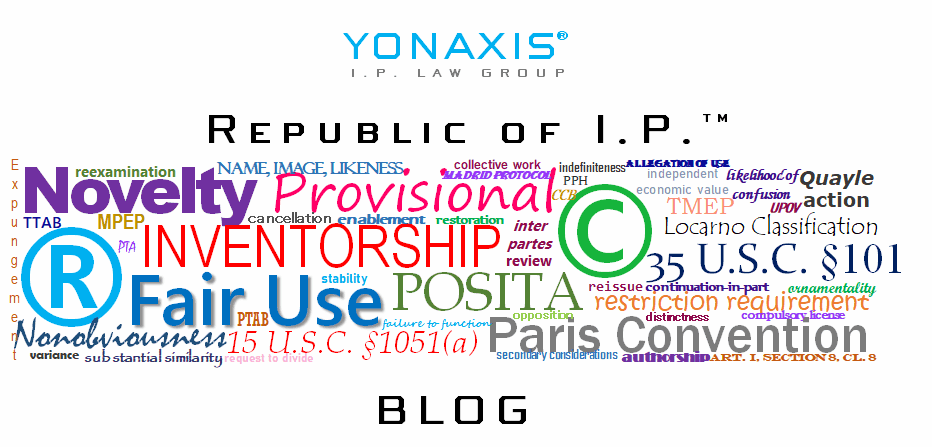Monsanto Co. is fighting back against the $289 million jury verdict for its glyphosate product, ROUNDUP®. On September 19, 2018, Monsanto filed two post-trial motions for relief with the Superior Court of California: motion for new trial and motion notwithstanding the verdict (JNOV) in attempts to overturn the verdict against its $6.6 billion product, where …
TechPat: U.S. Patent No. D822,755 S
U.S. Patent No. D822,755 S (‘755) issued on July 10, 2018, for “Eyeglasses.” It was issued to inventors Evan Spiegel of Venice, California, Lauryn Morris, of Los Angeles, California, David Meisenholder of Venice, California, and Qiaokun Huang of Venice, California. The applicant/assignee is Snap Inc., the parent company of the social media company Snapchat. Evan …
Fed Circuit Watch: Broad Wins Latest CRISPR Court Battle
On September 10, 2018, the Court of Appeals for the Federal Circuit decided Regents of the Univ. of Calif. v. Broad Inst., Inc.,[1] in the latest court battle in the CRISPR patent challenge pitting three of the nation’s largest research universities against each other. CRISPR, or “Clustered Regularly Interspaced Short Palindromic Repeats,” is a family …
Fed Circuit Watch: Nexus Required Between Attorney Fees Award and Misconduct
Another recently unsealed opinion from August 15, 2018 revealed a decision of the Court of Appeals for the Federal Circuit involving inequitable conduct and fee award. In the opinion dated July 28, 2018, in In re Rembrandt Techs., LP Patent Litigation,[1] the Fed Circuit held that while the district court did not abuse its discretion, …
CannabIP: U.S. Patent No. 9,987,567 B1
U.S. Patent No. 9,987,567 B1 issued on June 5, 2018, to inventor Ryan Delmoral Ko, of Coquitlam, British Columbia, Canada, and applicant/assignee NextLeaf Solutions Ltd., of Vancouver, British Columbia, Canada. NextLeaf is an extraction and distillation processing company of cannabis material. NextLeaf represents one of many cannabis-industry companies awaiting the country-wide legalization of cannabis in …
Fed Circuit Watch: Dangers of Pro Se Representation – Failure to Understand Procedural Rules
On August 27, 2018, the Court of Appeals for the Federal Circuit issued a rare trademark ruling, Zheng Cai, dba Tai Chi Green Tea Inc. v. Diamond Hong, Inc.,[1] dealing with the more mundane aspects of proper filing procedures and rules of evidence. It also served as a reminder of the dangers of USPTO applicants …
CannabIP: U.S. Patent No. 9,981,203 B2
U.S. Patent No. 9,981,203 B2 issued on May 29, 2018, entitled “Rapid drying extraction targeting oil resin plant extracts.” It was issued to applicant and inventor Ahmed Shuja of San Francisco, California. Ahmed Shuja is the co-founder of OGZ Holdings, a cannabis extraction research company, and lvl Analytics, a tech analytics startup; Dr. Shuja is …
Fed Circuit Watch: PTAB Error to Not Consider Arguments in Reply Brief
On August 27, 2018, the Court of Appeals for the Federal Circuit handed down Ericsson Inc. v. Intellectual Ventures I LLC,[1] in which the rules played an important role in decisions made in the case. The facts are as follows. Intellectual Ventures I owns U.S. Patent No. 5,602,831 (‘831), entitled “Optimizing packet size to eliminate …
Fed Circuit Watch: Enabling Scope of Design Patent Claims Expands – Greatly
In a potentially ground-breaking decision in design patent prosecution, the Court of Appeals for the Federal Circuit handed down In re Maatita,[1] on August 20, 2018. The facts are as follows. Ron Maatita filed a design patent application with the USPTO, Serial No. 29/404,677, claiming an athletic shoe sole design. As with all design patent …
Fed Circuit Watch: USPTO’s §315(b) “Real Party in Interest” Definition Too Narrow
Inter partes reviews (IPRs) (37 C.F.R. §42.100 et seq.) may be instituted by the USPTO, at its discretion, but there are some defined statutory requirements. On August 17, 2018, the Court of Appeals for the Federal Circuit unsealed an opinion that was originally written on July 9, 2018, Applications in Internet Time, LLC v. RPX Corp.,[1] which …
